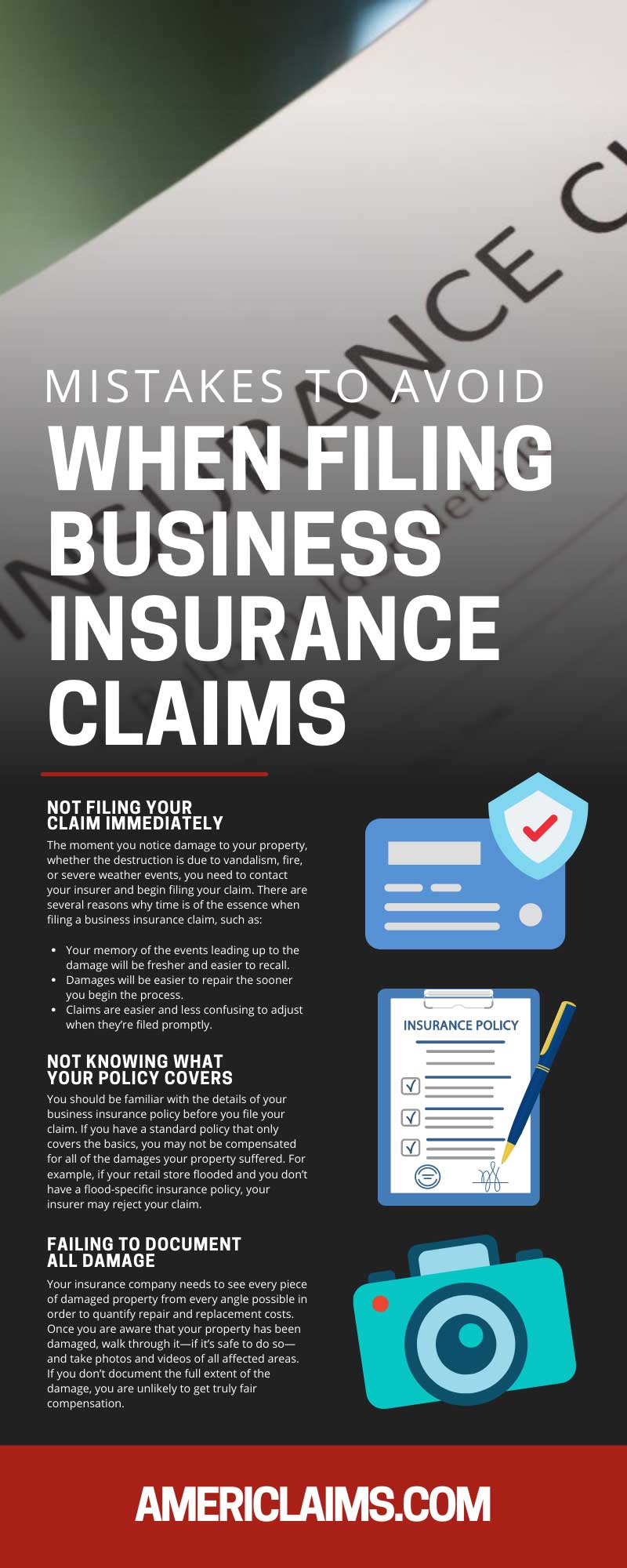6 Mistakes To Avoid When Filing Business Insurance Claims
No business owner looks forward to filing an insurance claim to recoup property losses. Going through your business insurance policy on your own can be confusing, and the distress of severe damage and loss only compounds that feeling.
Luckily, you never have to go through the claims process alone. Public insurance adjusters, like those at Americlaims, are dedicated to helping commercial property owners secure compensation for severe damage and loss of property. When you file your business insurance claim with the help of a public adjuster, they will advise you to avoid these mistakes throughout the process.
Not Filing Your Claim Immediately
The moment you notice damage to your property, whether the destruction is due to vandalism, fire, or severe weather events, you need to contact your insurer and begin filing your claim. There are several reasons why time is of the essence when filing a business insurance claim, such as:
- Your memory of the events leading up to the damage will be fresher and easier to recall.
- Damages will be easier to repair the sooner you begin the process.
- Claims are easier and less confusing to adjust when they’re filed promptly.
Many insurance companies employ quick-response teams to assess the damage as soon as possible after it occurs. Also, keep in mind that if you wait more than 48 hours after the damage to report it, your insurer may refuse your claim. Waiting too long to start this process can give your insurance company the false impression that the damage isn’t severe enough to warrant a claim.
Pro Tip:
If your business was damaged by water, whether from a flood or a plumbing malfunction, remediation must be done quickly in order to combat mold growth.
Not Knowing What Your Policy Covers
You should be familiar with the details of your business insurance policy before you file your claim. If you have a standard policy that only covers the basics, you may not be compensated for all of the damages your property suffered. For example, if your retail store flooded and you don’t have a flood-specific insurance policy, your insurer may reject your claim.
If you have difficulty understanding the specifics of your insurance policy, hire a commercial public adjuster to help you go through it line by line. They can identify policy exclusions and translate any fine print into language that’s more accessible.
Failing To Document All Damage
Your insurance company needs to see every piece of damaged property from every angle possible in order to quantify repair and replacement costs. Once you are aware that your property has been damaged, walk through it—if it’s safe to do so—and take photos and videos of all affected areas. If you don’t document the full extent of the damage, you are unlikely to get truly fair compensation.
Your public adjuster can help you with this process, as they will also document the damage for their own records. Because a public adjuster is paid a percentage of your settlement, they’ll do everything in their power to ensure that the payout is adequate. In fact, public insurance adjusters often catch damages and repair needs that insurance companies’ adjusters miss.
Not Notifying Authorities When Needed
If your business was damaged by vandalism or theft, you’ll need to get the police involved and file a report. Most insurance policies require that you file a police report if any illegal activity contributed to your property damage. This extra step helps the insurance company verify the validity of your claim and acts as evidence that you were not responsible for the damage.
Should you need to call the police about intentional damage to your business, notify them before you begin the claims process. Your insurer and your public adjuster will be glad to hear that you are taking the steps necessary to get justice for your ordeal.
Throwing Away Damaged Property
Walking through a business that’s been damaged by fire, vandalism, or severe weather can be stressful. You want to start cleaning up and repairing your property as soon as possible, and you may be tempted to throw away anything that’s too damaged to repair. After all, it’s cluttering up your space, and you need to clear it out in order to begin repairs.
However, you must stop and think before you declutter. All of those damaged items are evidence of your property damage and will need to remain as is until your insurer and your adjuster can inspect them. You wouldn’t fix up your car after an auto accident before your insurance company can look at the damage—the same principle applies to business property damage. Hold onto those ruined items until the claims process is finished and you have the green light to begin repairs and replacements.
Admitting Fault
Be careful about what you say to your insurer, your adjuster, and any relevant local authorities during the insurance claims process. Any statement you make that could be construed as admitting fault may stop your insurance claim in its tracks. If the insurance company finds that you were at fault for the damage, they have an easy excuse to deny you a settlement.
If a fire devastated several rooms in your business office, let the insurance company investigate it; don’t blurt out that you might have left a candle burning. If burglars got into your business overnight and stole half your inventory, avoid musing aloud about whether you left the doors unlocked.
Good To Know:
Your business insurance should include a liability policy to cover any injuries sustained on the property. If a customer slips and falls in your store, they may file a personal injury lawsuit against your business. Liability insurance generally covers those settlement costs—just make sure you don’t admit that their injury arose from anything you did.
When you file a business insurance claim, you’ll have several parties on your side throughout the process. Your insurance company, your public adjuster, and even local authorities can help you recover from severe property damage of all kinds. Take the time to avoid these mistakes as you file your business insurance claim, both to expedite the process and to ensure that the settlement you receive is full and fair.









